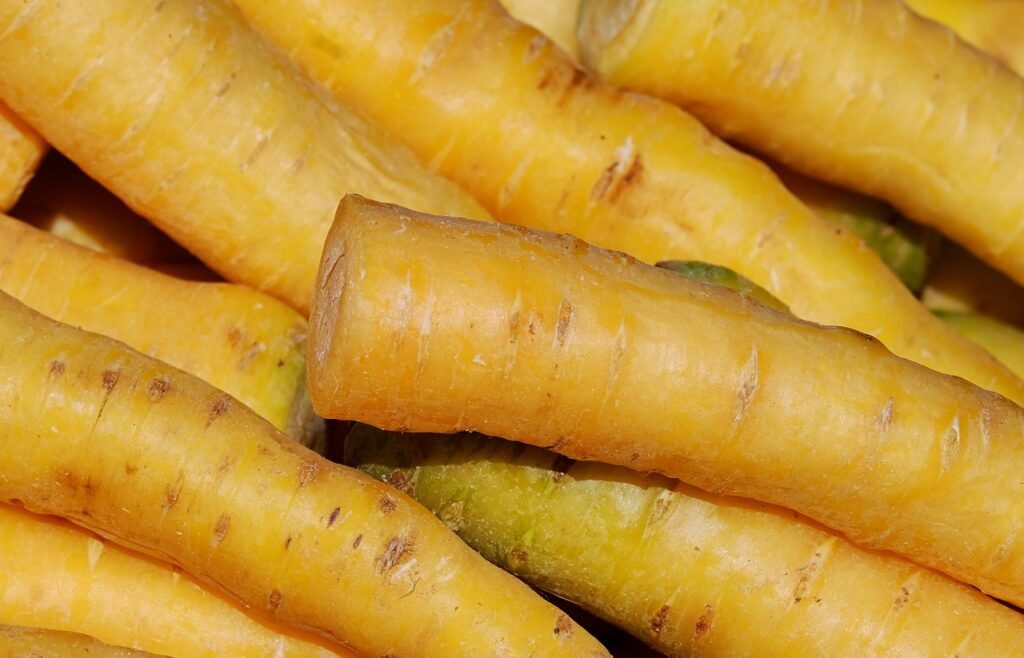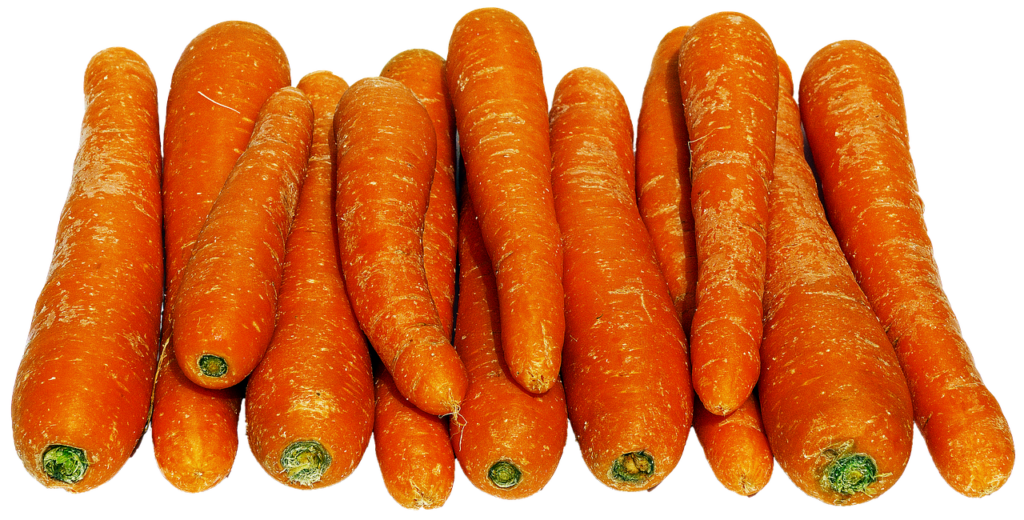Carrots, a common household vegetable, come in an array of colors – one of the less common being yellow. You may have wondered, are yellow carrots safe to eat? The answer is a resounding yes. Not only are they safe, but they also offer various health benefits that can contribute to your overall well-being. This article will delve into the safety and nutritional aspects of yellow carrots, debunking myths and providing you with a well-rounded understanding of this vibrant root vegetable.”
Introduction
Yellow carrots, a variety of the popular root vegetable, are often overlooked in favor of their orange counterparts. Despite their less common presence in grocery aisles, yellow carrots have a rich history and a unique profile of nutritional benefits. Originating in the Middle East and Asia, these brightly colored vegetables bring a sweet, mild flavor to the table, along with a host of vitamins and antioxidants.

The question of their safety often arises due to their unusual coloration and relative rarity compared to other carrot varieties. Rest assured, yellow carrots are not only safe to eat but they also offer an array of health benefits. Whether consumed raw or cooked, they can make a worthwhile addition to your diet. In the following sections, we will delve further into the nutritional profile, health benefits, and ways to incorporate yellow carrots into your meals.
Nutritional Profile of Yellow Carrots
Yellow carrots are packed with a variety of nutrients that contribute to overall health. They are rich in vitamins, including Vitamin A and Vitamin C. Vitamin A is essential for maintaining healthy vision, while Vitamin C plays a crucial role in boosting the immune system and acting as a powerful antioxidant. These carrots are also high in fiber, which aids in digestion and helps maintain a healthy weight by promoting feelings of fullness.
In addition to these, what sets yellow carrots apart is their high lutein content. Lutein is a type of carotenoid that is beneficial for eye health, particularly in preventing age-related macular degeneration and cataracts.

When compared to other carrot varieties, yellow carrots hold their own. Orange carrots, the most common variety, are known for their high beta-carotene content, which is converted into Vitamin A in the body. While yellow carrots contain less beta-carotene, they make up for it with their lutein content. Red and purple carrots, on the other hand, have high anthocyanin content, another type of antioxidant.
In terms of calories and basic nutritional content like carbohydrates, protein, and fats, all carrot varieties are quite similar. Therefore, incorporating a mix of carrot colors into your diet could provide a broader range of these beneficial compounds.
Health Benefits of Yellow Carrots
Digestive Health
Yellow carrots are a good source of dietary fiber, providing roughly 3.4 grams per cup. Fiber aids in maintaining a healthy digestive system by adding bulk to your diet and promoting regular bowel movements. This can help prevent constipation and other digestive issues. Moreover, a high-fiber diet is associated with lower risks of developing heart disease and type 2 diabetes.
Diabetes Management
The fiber content in yellow carrots also plays a role in managing diabetes. Dietary fiber, particularly soluble fiber, can slow the absorption of sugar into your bloodstream and prevent spikes in blood glucose levels. This makes yellow carrots a good food choice for those managing diabetes.
Protection Against Cancers:
The antioxidants found in yellow carrots, particularly lutein and Vitamin C, have been linked to a reduced risk of various types of cancer. Antioxidants fight against free radicals in the body, which can cause cellular damage and lead to diseases like cancer. Though more research is needed to fully understand this relationship, eating a diet rich in antioxidant-filled foods like yellow carrots can contribute to overall health and disease prevention.
Misconceptions about Eating Carrots

Carotenemia Myth
One common misconception is that consuming a large number of carrots can lead to a condition called carotenemia, where the skin turns yellow-orange due to an excess of carotenes in the blood. While it’s true that carotenemia can occur from eating an unusually high amount of carrots or other vegetables rich in carotenes, it’s important to note that this condition is harmless and easily reversible. Carotenemia does not cause health problems and simply reducing the intake of carotene-rich foods will return skin color to normal.
Harmless Skin Color Change
The change in skin color associated with carotenemia is entirely harmless and should not be a cause for concern. It’s a temporary and reversible condition that doesn’t damage the skin or any other tissues. The carotenes causing this color change are antioxidants that help protect your cells from damage. So while you might notice a slight change in skin color if you greatly increase your carrot intake, remember that it’s a harmless side effect of consuming a nutrient-dense food.
How to Incorporate Yellow Carrots in Your Diet
Raw Consumption:
Yellow carrots can be enjoyed raw and this method of consumption ensures you get the maximum nutritional benefits. They make a great addition to salads or can be cut into sticks and served with a dip for a healthy snack. You can also grate them and add them to coleslaw or wraps for a crunchy texture. Another option is to juice them with other fruits and vegetables for a nutrient-packed drink.
Cooking Methods
When it comes to cooking yellow carrots, the goal is to preserve as much of their nutrients as possible. Steaming is a great way to achieve this. It softens the carrots while keeping the nutrients intact. Roasting is another method that can enhance their natural sweetness without compromising too much on the nutrient content. If you prefer boiling your carrots, try to keep the boiling time short and consider using the leftover water in soups or sauces, as some of the nutrients may leach out into the water during boiling (source).
Regardless of how you choose to consume them, incorporating yellow carrots into your diet can contribute to your overall nutritional intake and provide you with their unique health benefits.
Conclusion
Yellow carrots are not only delicious, but they also come packed with numerous health benefits. They contribute to digestive health thanks to their high fiber content and can aid in managing diabetes due to their ability to regulate blood sugar levels. The antioxidants present in these vibrant vegetables may also offer protection against various types of cancers. Misconceptions such as carotenemia, a harmless and reversible condition that can cause a slight change in skin color due to excessive consumption, should not deter you from enjoying this nutritious vegetable.
Incorporating yellow carrots into your diet is a simple and effective way to increase your intake of essential nutrients. Whether you choose to consume them raw in salads, snacks or juices, or prefer them steamed or roasted, they add both flavor and nutrition to your meals. Remember, a balanced diet is key to good health, and yellow carrots can certainly be a part of that balance. So, go ahead and enjoy the crunchy goodness of yellow carrots and reap their health benefits!
Frequently Asked Questions (FAQs)
Are yellow carrots as nutritious as orange ones?
Yes, yellow carrots are just as nutritious as their orange counterparts. They contain similar amounts of fiber and other nutrients, with the main difference being the types of antioxidants they carry.
Can eating too many yellow carrots cause my skin to change color
Yes, consuming an unusually high amount of yellow carrots, which are rich in carotenes, can lead to a condition called carotenemia, resulting in a yellow-orange skin tone. However, this condition is harmless and easily reversible.
What is the best way to cook yellow carrots to retain their nutritional value?
Steaming and roasting are great methods that preserve the nutrients in yellow carrots while enhancing their flavor. If you prefer boiling, keep the boiling time short and use the leftover water in soups or sauces to utilize the nutrients that may have leached out.
Can people with diabetes eat yellow carrots?
Yes, the fiber content in yellow carrots can help manage blood sugar levels, making them a good food choice for those managing diabetes.
Can yellow carrots help reduce the risk of cancer?
While the antioxidants in yellow carrots have been linked to a reduced risk of various types of cancer, more research is needed to fully understand this relationship. However, a diet rich in antioxidant-filled foods like yellow carrots can contribute to overall health and disease prevention.
Sources
- Specialty Produce
- MedicineNet
- Inverse
- Healthline
- Cleveland Clinic
- Quora
- BunSpace Forum
- Medical News Today





